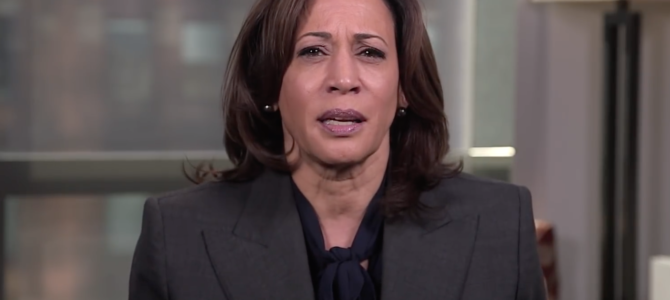
This time last year, I would have said Kamala Harris was the one to beat. Early in her senate term, Harris’s under-appreciated indictment of identity politics struck me as an indication she was onto something her progressive peers didn’t quite get. Turns out she didn’t get it either.
Surely the forthcoming flood of Harris campaign autopsies will note the senator’s failure to pick a lane. It’s true, she floundered between the progressive and moderate left, unsure how to address her record as a prosecutor, fumbling to appeal to both ends of the spectrum. What emerged was a candidate who failed to believably represent either of those ends—or to bridge the gap effectively. Of course, that’s no easy task, but Harris seemed to be headed in a much better direction before actually entering the race.
We, as Democrats and progressives, cannot afford to be guilty of putting people in these narrow boxes based on what we have decided is their identity instead of seeing that they have lived full lives. They are full people, as multifaceted as the other people we know.
That’s downright Bidenesque. The quote is actually from Harris circa 2017, delivered to a tough crowd of progressive activists, according to a Los Angeles Times profile. That profile also included a preview of the senator’s infamous “3 a.m. agenda,” which would come to be a prominent feature in her campaign, and was intended to convey a focus on the policy issues that keep voters up at night over partisan battles. “When we wake up at 3 in the morning or something is troubling us, it is never through the lens of, ‘am I Democrat or Republican,’ or on our identity based on what other people have decided is our identity,” Harris said.
By August of this year, when the senator put the “3 a.m. agenda” at the center of her first campaign ad, the identity component of that message had been dropped. To the contrary, the ad actually included a pandering nod to the so-called gender wage gap. There’s also this tweet, which is an interesting evolution from a line she delivered at Netroots Nation in 2018.
The phrase “identity politics” is used to marginalize the significance of a topic, to quiet us down, or shut us up.
But here’s the truth: Where we stand on important issues — everything from the racial wealth gap to equal pay — is about America's identity.
— Kamala Harris (@KamalaHarris) August 26, 2019
At Netroots a year earlier, Harris said, “I have a problem, guys, with that phrase, ‘identity politics.’ Because let’s be clear, when people say that, it’s a pejorative. That phrase is used to divide, and it is used to distract. Its purpose is to minimize and marginalize issues that impact all of us. It is used to try and shut us up.” Note that by 2019, she was at least gesturing towards the relevance of identity.
These attitudinal shifts—and the one in the ad particularly—represent the problem with Harris’s candidacy in a nutshell. It essentially amounted to one long, awkward and oblivious attempt at blending pragmatism with progressive identity politics. But the balance was off.
This is what kept her from functioning as a younger, more progressive alternative to Joe Biden, and a younger, less extreme alternative to Elizabeth Warren and Bernie Sanders. A more confident and targeted Harris campaign would have closed the lane Michael Bloomberg and Deval Patrick are exploring by eagerly being the candidate with progressive credibility who leveraged it to speak to the cultural frustrations of older Democrats. While fair at the time, Vanity Fair’s labeling of Harris as a “non-identity politician” in 2018 would not be true at all to the race she ran this year.
The candidate that ultimately emerged was muddled and inauthentic. To be fair, Harris’s early distaste for identity politics (and partisan purity tests!), may have been little more than an opportunistic trial balloon. But a better campaign would have recognized the scope of the appetite for Biden’s Obama-style progressivism coupled with an anti-identity streak, and adjusted accordingly, resisting the urge to make so many overtures to the far left.
Again, the task would not have been easy, which certainly speaks to the difficult balancing act confronting Democrats stuck between the demands of purists on the far left and older, less progressive voters. But Harris was actually well-positioned to thread that needle. In retrospect it seems the distorted picture of the Democratic electorate shared by those in the Twitter-media bubble prompted her campaign to swerve into the median and out of a better lane—one that packaged Bidenism in better, slightly more progressive wrapping, while also maintaining appeal among the many Democrats who share the current frontrunner’s exhaustion with identity politics.









